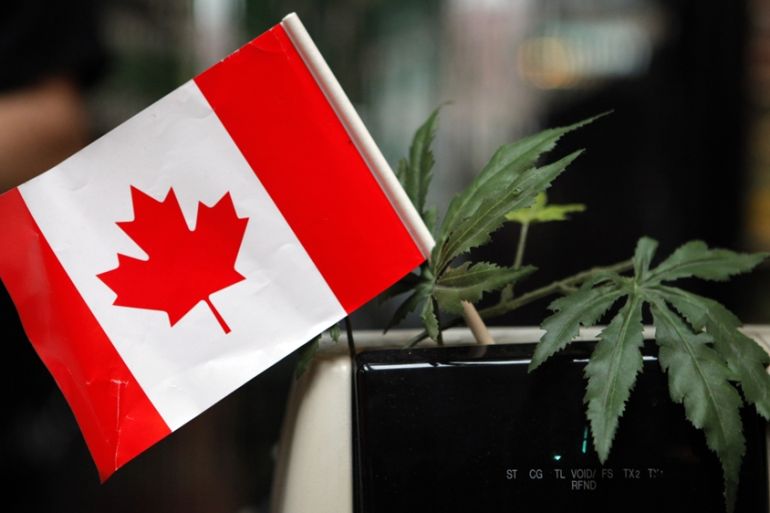Canada becomes second country to legalise recreational cannabis
More than 100 legal marijuana shops to open across the country on Wednesday as government throws out pot convictions.

Canada became the second and largest country with a legal national cannabis marketplace on Wednesday.
Tom Clarke, an illegal pot dealer for three decades, was among the first to make a legal sale in Canada when his store opened at midnight (02:30 GMT) in Portugal Cove, Newfoundland.
Keep reading
list of 4 itemsWhat to know about Chinese Olympic swimmers’ doping scandal
West Africa’s Sahel becoming a drug trafficking corridor, UN warns
Behind India’s Manipur conflict: A tale of drugs, armed groups and politics
“I am living my dream. Teenage Tom Clarke is loving what I am doing with my life right now,” he told The Associated Press.
Canada follows only Uruguay in legalising recreational cannabis nationwide.
At least 111 legal pot shops are planning to open across the nation of 37 million people on the first day, according to an AP survey of the provinces. That is a small slice of what ultimately will be a much larger marketplace.
No stores will open in Ontario, which includes Toronto. The most populous province is working on its regulations and doesn’t expect stores until next spring.
Canadians everywhere will be able to order marijuana products through websites run by provinces or private retailers and have it delivered to their homes by mail.
Pardon me?
There was more good news for pot aficionados: Hours before retail outlets opened, a federal official told AP Canada will pardon all those with convictions for possessing up to 30 grams of marijuana, the now-legal threshold.
A formal announcement was planned for later Wednesday. The official, who was not authorized to speak publicly ahead of the announcement, said those who want to take advantage of the pardons will have to apply.
Canada has had legal medical marijuana since 2001 and amid excitement over the arrival of legal recreational cannabis many in the industry spent the last days of prohibition on tasks familiar to any retail business – completing displays, holding mock openings and training employees to use sales-tracking software.
“It’s been hectic,” said Roseanne Dampier, who joined her husband – both former welders – in opening Alternative Greens, a licensed store in Edmonton, Alberta.
“We have been extremely busy just trying to be able to meet that deadline.”
Years in the making
Canada’s federal government, led by Prime Minister Justin Trudeau, spent about two years planning for legalisation, fueled by a desire to bring dealers like Clarke out of the black market and into a regulated system.
Canada’s national approach has allowed for unfettered industry banking, inter-province shipments of cannabis and billions of dollars in investment – a sharp contrast with national prohibition in the United States. Nine US states have legalised recreational use of cannabis and more than 30 have approved medical marijuana.
“Now that our neighbour to the north is opening its legal cannabis market, the longer we delay, the longer we miss out on potentially significant economic opportunities for Oregon and other states across the country,” US Democratic Senator Ron Wyden of Oregon said in a statement.
US Customs and Border Protection invited Canadian media to a conference call on Tuesday so officials could reiterate that marijuana remains illegal under US federal law and that those who are caught at the border with marijuana are subject to arrest and prosecution.
A patchwork of regulations has spread in Canada as each province takes its own approach within the framework set out by the federal government. Some are operating government-run stores, some are allowing private retailers, some both.
Alberta and Quebec have set the minimum age for purchase at 18, while others have made it 19.
The provinces also have been able to decide for themselves how much to mark up the marijuana beyond the 10 percent or $1 per gram imposed by the federal government, and whether to allow residents to grow up to four plants at home.
Growing pains expected
Trevor Fencott, chief executive of Fire and Flower, said his company has 15 Alberta stores staffed and ready to sell marijuana, but the province has supplied only enough product to open three of them on Wednesday.
“We’re aware of some of the kinks or growing pains that come with creating an industry out of whole cloth in 24 months,” Fencott said.
Brenda Tobin and her son Trevor plan to open their pot shop in Labrador City in Newfoundland and Labrador at 4:20pm., a reference to 420, slang for the consumption of cannabis. Tobin, a longtime convenience store owner, said they will be cutting a ribbon and cake.
“We are just ecstatic,” she said.
She doesn’t expect to make much money off the pot itself, noting Newfoundland’s eight percent cap on retail pot profits. She hopes to make money from pipes, bongs and marijuana paraphernalia.
“There’s no money in the product itself,” she said. “You got to sell $250,000 worth of product in order to make $20,000. That’s not even paying someone’s salary.”
Ontario won’t have any stores open until April, after the new conservative government scrapped a plan for state-owned stores in favour of privately run shops. British Columbia on the Pacific Coast will have just one store open on Wednesday, but many more are expected to open in the coming months. Quebec will have 12 open.
“It’s a historic day, a real first,” said Alain Brunet, project manager for the Quebec’s government corporation overseeing the stores. “The first G7 country to legalise cannabis coast-to-coast, and the second country in the world, after Uruguay.”